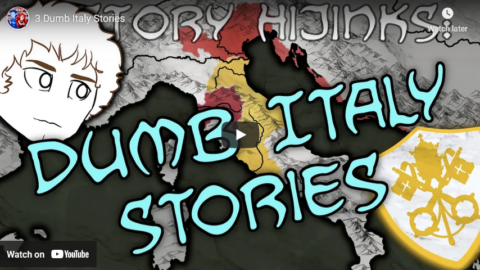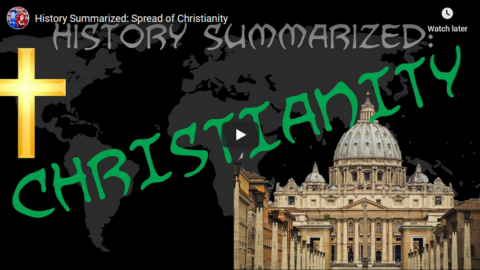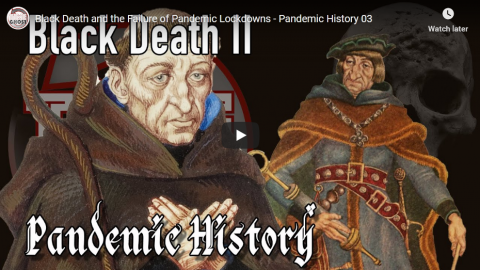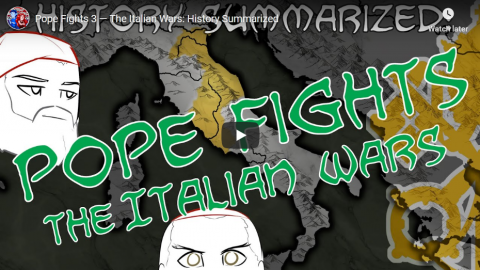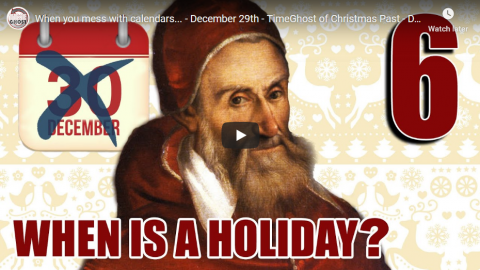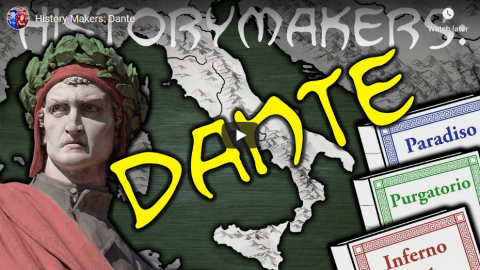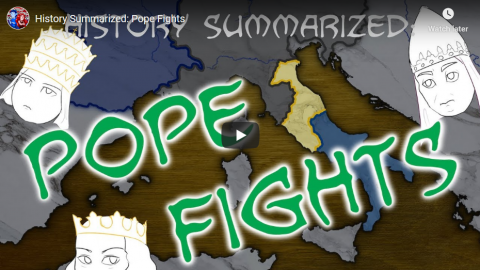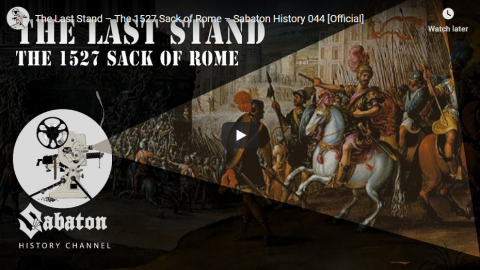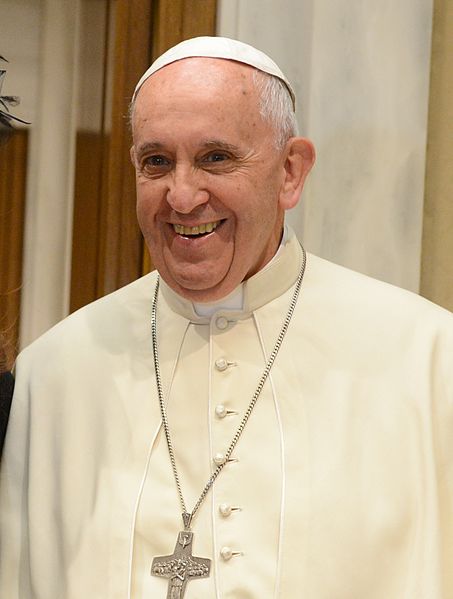Overly Sarcastic Productions
Published 8 Jan 2021If I had the time and energy, I’d have researched for a new video, but I have neither of those things right now, so you get Italy. Don’t worry, I made it extra snarky to compensate.
SOURCES & Further Reading: I, uh, well, most of the anecdotal information in this video came by way of tours I myself went on and somehow managed to retain 9 years later, but as always, you can find more on Florence & Venice in Florence: The Biography of A City by Christopher Hibbert and A History Of Venice by John Julius Norwich.
Our content is intended for teenage audiences and up.
PATREON: https://www.Patreon.com/OSP
PODCAST: https://overlysarcasticpodcast.transi…
DISCORD: https://discord.gg/osp
MERCH LINKS: http://rdbl.co/osp
OUR WEBSITE: https://www.OverlySarcasticProductions.com
Find us on Twitter https://www.Twitter.com/OSPYouTube
Find us on Reddit https://www.Reddit.com/r/OSP/
January 9, 2021
Three Dumb Italy Stories
December 15, 2020
History Summarized: Spread of Christianity
Overly Sarcastic Productions
Published 10 Jan 2017Things I learned when making this video: 1) when your script goes beyond 4 single-spaced pages, you’re heading into the danger zone 2) Gregorian Chants are awesome and you should totally listen to them, 3) editing always takes longer than you’d hope 4) self care is huffing frankincense for breakfast lunch and dinner and single-handedly sacking a levantine city!
Have a question about something I mentioned, or maybe something I might have left out? Leave it down below and I’ll do my best to respond!
PATREON: https://www.patreon.com/OSP
MERCH LINKS:
Shirts – https://overlysarcasticproducts.threa…
All the other stuff – http://www.cafepress.com/OverlySarcas…Find us on Twitter @OSPYouTube!
twitter.com/OSPyoutube
June 18, 2020
Black Death and the Failure of Pandemic Lockdowns – Pandemic History 03
TimeGhost History
Published 17 Jun 2020Starting in 1347 and for three centuries, the second plague pandemic provides ample time to learn how to deal with the recurring outbreaks. And yet, fears of ruining the economy, political expediency, and refusal to accept reality leaves those trying to implement protection measure to fight an uphill battle. The result is even worse economic consequences, and unfathomable death.
Join us on Patreon: https://www.patreon.com/TimeGhostHistory
Hosted by: Indy Neidell and Spartacus Olsson
Written by: Indy Neidell and Spartacus Olsson
Directed by: Astrid Deinhard
Executive Producers: Astrid Deinhard, Indy Neidell, Spartacus Olsson, Bodo Rittenauer
Creative Producer: Joram Appel
Post-Production Director: Wieke Kapteijns
Research by: Spartacus Olsson, Indy Neidell, and James Currie
Edited by: Karolina Dołęga
Sound Engineer: Marek Kamiński
Graphic Design: Ryan WeatherbyVisual Sources:
Wellcome Images
Patrick Gray on Flickr: https://www.flickr.com/photos/1360415…
Paul K on Flickr: https://www.flickr.com/photos/bibliod…
Quinto Tiberio Angelerio and New Measures for Controlling Plague in 16th-Century Alghero, Sardinia digitalized by Google, original from Universidad Complutense de MadridIcons from The Noun Project by: Ben Mullins, parkjisun, Muhamad Ulum & Adrien Coquet
Music:
“A Far Cry” – Flouw
“Fire Building Ext 3” – SFX Producer
“Last Point of Safe Return” – Fabien Tell
“London” – Howard Harper-Barnes.mp3
“Please Hear Me Out” – Philip Ayers
“Scream Female 3” – SFX Producer
“Scream Male 6” – SFX Producer
“Superior” – Silver Maple
“Symphony of the Cold-Blooded” – Christian Andersen
“Barrel” – Christian AndersenArchive by Screenocean/Reuters https://www.screenocean.com.
Research Sources:
Quinto Tiberio Angelerio and New Measures for Controlling Plague in 16th-Century Alghero, Sardinia Raffaella Bianucci, Ole Jørgen Benedictow, Gino Fornaciari, and Valentina Giuffra
“The Path to Pistoia: Urban Hygiene Before the Black Death”, G. Geltner, Past & Present, Volume 246, Issue 1, February 2020, Pages 3–33
Encyclopedia of the Black Death, Joseph Patrick Byrne
“Epidemiological characteristics of an urban plague epidemic in Madagascar, August–November, 2017: an outbreak report”, The Lancet, Rindra Randremanana, PhD, *Voahangy Andrianaivoarimanana, PhD, Birgit Nikolay, PhD, Beza Ramasindrazana, PhD, Juliette Paireau, PhD, Quirine Astrid ten Bosch, PhD, et al
Yersinia pestis, the cause of plague, is a recently emerged clone of Yersinia pseudotuberculosis, Mark Achtman, Kerstin Zurth, Giovanna Morelli, Gabriela Torrea, Annie Guiyoule, and Elisabeth Carniel
Insights into the evolution of Yersinia pestis through whole-genome comparison with Yersinia pseudotuberculosis, P.S.G. Chain, E. Carniel, F.W. Larimer, J. Lamerdin, P.O. Stoutland, W.M. Regala, A.M. Georgescu, L.M. Vergez, M.L. Land, V.L. Motin, R.R. Brubaker, J. Fowler, J. Hinnebusch, M. Marceau, C. Medigue, M. Simonet, V. Chenal-Francisque, B. Souza, D. Dacheux, J.M. Elliott, A. Derbise, L.J. Hauser, and E. Garcia
Distinct Clones of Yersinia pestis Caused the Black Death, Stephanie Haensch, Raffaella Bianucci, Michel Signoli, Minoarisoa Rajerison, Michael Schultz, Sacha Kacki, Marco Vermunt, Darlene A. Weston, Derek Hurst, Mark Achtman, Elisabeth Carniel, and Barbara BramantiA TimeGhost chronological documentary produced by OnLion Entertainment GmbH.
From the comments:
TimeGhost History
2 days ago
As you have seen in this episode collective learning takes time. Some of you might infer one to one parallels between the situation during the second plague pandemic and our current pandemic in 2020. That would not be entirely correct and definitely not our intention. History doesn’t as much repeat itself as it echos into the present. While there are similarities between all pandemics, and we continue to struggle to find the correct response and countermeasures, our times are very different from the medieval and renaissance world. Science has developed further, society has evolved, and we have much more than one form of response to disease available. Moreover the pandemic that started in 1347 is in relative numbers (percentage of lethality) the worst pandemic to hit humanity in known history.In the end we are historians, not health professionals or epidemiologists. Our contribution can never be what to do about COVID 19, that is too complex an issue for us to digest. What we can contribute is a historical perspective on what went wrong back then, and how we developed from there. The main takeaway from the Black Death should from that long term historical perspective be positive. The response lay the foundation of modern health care in hospitals. It helped create the beginnings of professional, trained, and vetted doctors, it changed the view on sanitation, and it started to shift our collective view on disease from superstition and conspiracy myths to factual analysis and a scientific response.
And there in that very last point lies perhaps the one and only thing that we can say with certainty that we need to remember in 2020 — listen to the scientists, not the hacks and politicians on all sides that base their rhetoric on, self interest, political expediency, and populism.
Never forget!
Spartacus
PS apologies for the audio problems on my mic during the first half of the video — it was scratching against my jacket and no one noticed, sadly we can’t get it out in post.
June 6, 2020
Pope Fights 3 — The Italian Wars: History Summarized
Overly Sarcastic Productions
Published 5 Jun 2020It’s time for a POPE FIIIIIIIIIIIIGHT!!!!! Gather ’round and listen to a tale of the utter nonsense that is the Renaissance Papacy. We’ll look at the Pontifical careers of Rodrigo Borgia, Julius II, Leo X, and Clement VII.
SOURCES & Further Reading: Rome: A History In Seven Sackings by Kneale, A History of Venice by Norwich.
This video was edited by Sophia Ricciardi AKA “Indigo”. https://www.sophiakricci.com/
Our content is intended for teenage audiences and up.PATREON: https://www.Patreon.com/OSP
MERCH LINKS: https://www.redbubble.com/people/OSPY…
OUR WEBSITE: https://www.OverlySarcasticProductions.com
Find us on Twitter https://www.Twitter.com/OSPYouTube
Find us on Reddit https://www.Reddit.com/r/OSP/
March 25, 2020
Armchair History: The Borgia
Overly Sarcastic Productions
Published 30 Jun 2015CONTENT DISCLAIMER: This video no longer meets my standards of quality for historical research and presentation. I made this one in the days long past, when the question of “How do I make an entertaining and historically interesting video” was answered by “IDK, memes I guess?”. This video in particular was an experiment with a shorter format, and is by no means definitive history. Take the video above with a grain of salt and enjoy the jokes.
In what could be a landmark in terms of progress, Overly Sarcastic Productions has decided to start making SHORT videos as well as rather long ones.
The Borgias were one messed up family, I tell you what.
March 22, 2020
QotD: The notion of Hell
I know we all follow the theological debates within Catholicism about which saint got in touch with which angel to channel which biblical dead person — don’t they have a show on CNN that goes over each week’s highlights? — but one thing you never do, in Catholicism, Protestantism, or Pentecostal Snake-Handlingism, for that matter, is say there’s no hell.
Because that would be Jewish. The Jews have never cared that much about hell. They grudgingly admit that it’s probably there, but it’s just this place that, after you die, you feel intense shame before God for all the times you yelled at your wife or failed to stuff two dollars into the self-parking kiosk. The Hebrew word for hell is “Gehenna,” which is the name of the garbage dump outside Jerusalem that (a) smelled bad, and (b) was always on fire. I can imagine generations of parents using it as a threat to their unruly children: “If you don’t straighten up right this minute, I’m gonna throw you into the smelly garbage dump with the smoke cloud over it!”
So when the Christians come along, they take Gehenna and run with it. They use the name Gehenna to mean hell, and that’s not just trash burning out there, it’s demons and human souls, and it burns forever because it’s mixed with brimstone, which does indeed smell bad when you burn it. Actually brimstone turns red and burns blue, so if you’ve got brimstone out there, you’ve got a blood red gelatinous mass with a blue flame, or what the great preachers call …
The Lake of Fire.
[…]
At any rate, the reason the Catholic press got their cassocks in a bunch is that, over the past half century or so, a lot of theologians have been saying, “Maybe we got the whole hell thing wrong.” They’ve looked back over the appropriate scriptures and decided that, after you die, you don’t get thrown into the flaming garbage dump, you just vanish from all human history, as though you never existed. There’s no memory or trace of you, you’re erased from the universe.
And this might be what the Pope said he believes. After Eugenio reported their conversation, the Vatican scrambled around and issued statements saying that, no, the Pope didn’t go outside the catechism and they were just chewing the fat and please everybody let’s not get carried away. Yes, Gehenna is real. Yes, the Pope believes in hell. Yes, the Pope is Catholic.
Joe Bob Briggs, “Pope Forgets the Lake of Fire”, Taki’s Magazine, 2018-06-21.
March 19, 2020
Second Crusade | 3 Minute History
March 5, 2020
First Crusade | 3 Minute History
December 30, 2019
When you mess with calendars… – December 29th – TimeGhost of Christmas Past – DAY 6
TimeGhost History
Published 29 Dec 2019Our perception of time has changed a lot in human history. Even more so when we try to shape our days, weeks, months and years in the “most convenient” way possible.
Join us on Patreon: https://www.patreon.com/TimeGhostHistory
Hosted by: Indy Neidell
Written by: Joram Appel
Directed by: Spartacus Olsson and Astrid Deinhard
Executive Producers: Bodo Rittenauer, Astrid Deinhard, Indy Neidell, Spartacus Olsson
Creative Producer: Joram Appel
Post-Production Director: Wieke Kapteijns
Research by: Joram Appel
Edited by: Mikołaj Cackowski, Iryna Dulka
Sound design: Marek KamińskiSources:
– Old Swiss Confederacy map by Marco Zanoli from Wikimedia CommonsSoundtracks from Epidemic Sound:
– “A Sleigh Ride Into Town” – Howard Harper-Barnes
– “In Our Holiday Home” – Arthur Benson
– “Christmas Bliss” – Mike FranklynA TimeGhost chronological documentary produced by OnLion Entertainment GmbH.
December 22, 2019
History-Makers: Dante
Overly Sarcastic Productions
Published 20 Dec 2019From the visionary creator who brought you the Self-Insert Fanfic comes… the invention of Worldbuilding and the most revolutionary literature in history? Woah, that was unexpected.
Grab your nearest Virgil, because we’re about to dive into Dante’s complex afterlife and learn how a Florentine poet used an ancient genre of poetry to kickstart what would become the Renaissance.
Further Reading: I would highly recommend Allen Mandelbaum’s translation of the Divine Comedy (Bantam Classics makes it), specifically because it features an opposite-facing translation, so the English appears directly adjacent to the original Italian. Regardless of your familiarity with Italian, Dante’s use of language is beautiful to listen to. It’s also just a good translation in general. Please do yourself a favor and read through some Dante.
Our content is intended for teenage audiences and up.
DISCORD: https://discord.gg/sS5K4R3
PATREON: https://www.Patreon.com/OSP
MERCH LINKS: https://www.redbubble.com/people/OSPY…
OUR WEBSITE: https://www.OverlySarcasticProductions.com
Find us on Twitter https://www.Twitter.com/OSPYouTube
Find us on Reddit https://www.Reddit.com/r/OSP/
December 18, 2019
History Summarized: Pope Fights
Overly Sarcastic Productions
Published 24 Aug 2018The Medieval Catholic Church was … an interesting place, to put it lightly. Sometimes there was more than one Pope at a time, and sometimes they fought each other for power. Ladies and Gentleman, I present to you Pope Fights! The most absurd chapter in all of Catholicism.
Pope Francis’ Rock Album, if you’re still not convinced: https://www.youtube.com/watch?v=hW3az…
PATREON: https://www.patreon.com/user?u=4664797
Find us on Twitter @OSPYouTube!
December 6, 2019
“The Last Stand” – The 1527 Sack of Rome – Sabaton History 044 [Official]
Sabaton History
Published 5 Dec 2019In 1527, a large Holy Roman army consisting of Germans, Spaniards and Italians march on Rome frustrated over unpaid wages and lacking supplies. Pope Clement VII seeks shelter as Rome is pillaged and burned while his brave Swiss Guard makes a heroic last stand.
Support Sabaton History on Patreon: https://www.patreon.com/sabatonhistory
Listen to The Last Stand (where “The Last Stand” is featured):
CD: http://bit.ly/TheLastStandStore
Spotify: http://bit.ly/TheLastStandSpotify
Apple Music: http://bit.ly/TheLastStandItunes
iTunes: http://bit.ly/TheLastStandItunes
Amazon: http://bit.ly/TheLastStandAmz
Google Play: http://bit.ly/TheLastStandGooglePlayWatch the official lyric video of “The Last Stand” here: https://www.youtube.com/watch?v=BwfJs…
Listen to Sabaton on Spotify: http://smarturl.it/SabatonSpotify
Official Sabaton Merchandise Shop: http://bit.ly/SabatonOfficialShopHosted by: Indy Neidell
Written by: Markus Linke and Indy Neidell
Directed by: Astrid Deinhard and Wieke Kapteijns
Produced by: Pär Sundström, Astrid Deinhard and Spartacus Olsson
Creative Producer: Joram Appel
Executive Producers: Pär Sundström, Joakim Broden, Tomas Sunmo, Indy Neidell, Astrid Deinhard, and Spartacus Olsson
Post-Production Director: Wieke Kapteijns
Production Intern: Rune Vaever Hartvig
Edited by: Iryna Dulka
Sound Editing by: Marek Kaminski
Maps by: Eastory – https://www.youtube.com/c/eastoryArchive by: Reuters/Screenocean https://www.screenocean.com
Music by Sabaton.Sources:
– Rijksmuseum
– Fondo Antiguo de la Biblioteca de la Universidad de Sevilla
– A massacre in a church during the Sack of Rome: a priest is about to be stabbed and another priest is lying dead on the floor before the altar. Wood engraving by R. Venturi after himself. Credit: Wellcome Collection. CC BY
– Guy de Chauliac bandaging the leg of Pope Clement VII at Avi. Oil painting by Ernest Board. Credit: Wellcome Collection. CC BY
– Photo of Sistine Chapel ceiling by Qypchak
– Photo of Arco delle Campane by Przemek PietrakAn OnLion Entertainment GmbH and Raging Beaver Publishing AB co-Production.
© Raging Beaver Publishing AB, 2019 – all rights reserved.
February 27, 2019
First Crusade Part 1 of 2
Epic History TV
Published on 13 Jan 2017The First Crusade was one of the most extraordinary, bloody and significant episodes in medieval history. It began with an appeal for aid from the Christian Byzantine Empire, threatened by the rising power of the Muslim Seljuk Turks. But when Pope Urban II preached a sermon at Clermont in 1095, the result was unlike anything ever seen before. The Pope offered spiritual salvation to those willing to go east to aid their fellow Christians in a holy war, and help liberate Jerusalem from Muslim rule. Knights and peasants alike signed up in their thousands, leading to the disastrous People’s, or Peasants’, Crusade, then to a much more organised and powerful Princes’ Crusade. Their forces gathered at Constantinople, where they made an uneasy alliance with Byzantine Emperor Alexius I Comnenus. Entering Anatolia, they helped to win back the city of Nicaea, then won a decisive but hard-fought victory at Dorlyaeum, before marching on the great city of Antioch…
Produced in partnership with Osprey Publishing
https://ospreypublishing.com/Campaign: The First Crusade 1096–99
https://ospreypublishing.com/the-firs…Essential Histories: The Crusades
https://ospreypublishing.com/the-crus…The Armies of Islam 7th–11th Centuries
https://ospreypublishing.com/the-armi…Armies of the Crusades
https://ospreypublishing.com/armies-o…Music with thanks to Filmstro: https://www.filmstro.com/
Get 20% off an annual license! Use our exclusive coupon code: EPICHISTORYTV_ANNImage credits – via Flickr under Creative Commons CC-BY-SA 2.0
Sky – Anyul Rivas
Wooded Hills – Alexander Annenkov
Dramatic Fields – Antonio Caiazzo
Twin peaks of Mount Ararat – Adam JonesPlease help me make more videos at Patreon: https://www.patreon.com/EpicHistoryTV
March 30, 2018
Having served its purpose for two thousand years, the Pope now says there is no Hell
Who said that Holy Week was a slow news week? Michael W. Chapman (via Ann Althouse) reports on the latest revelation from the head of the Catholic Church:
In another interview with his longtime atheist friend, Eugenio Scalfari, Pope Francis claims that Hell does not exist and that condemned souls just “disappear.” This is a denial of the 2,000-year-old teaching of the Catholic Church about the reality of Hell and the eternal existence of the soul.
The interview between Scalfari and the Pope was published March 28, 2018 in La Repubblica. The relevant section on Hell was translated by the highly respected web log, Rorate Caeli.Pope Francis in a meeting with President Christina Fernandez de Kirchner of Argentina in the Casa Rosada.
Attribution: Casa Rosada (Argentina Presidency of the Nation), via Wikimedia CommonsThe interview is headlined, “The Pope: It is an honor to be called revolutionary.” (Il Papa: “È un onore essere chiamato rivoluzionario.”)
Scalfari says to the Pope, “Your Holiness, in our previous meeting you told me that our species will disappear in a certain moment and that God, still out of his creative force, will create new species. You have never spoken to me about the souls who died in sin and will go to hell to suffer it for eternity. You have however spoken to me of good souls, admitted to the contemplation of God. But what about bad souls? Where are they punished?”
Pope Francis says, “They are not punished, those who repent obtain the forgiveness of God and enter the rank of souls who contemplate him, but those who do not repent and cannot therefore be forgiven disappear. There is no hell, there is the disappearance of sinful souls.”
The post was later updated with a note from the Vatican:
“The Holy Father Francis recently received the founder of the newspaper La Repubblica in a private meeting on the occasion of Easter, without however giving him any interviews. What is reported by the author in today’s article [in La Repubblica] is the result of his reconstruction, in which the textual words pronounced by the Pope are not quoted. No quotation of the aforementioned article must therefore be considered as a faithful transcription of the words of the Holy Father.”
So either Scalfari misunderstood what his old friend was saying, or he’s just been thrown under a holy bus. I have no god in this fight, but it’s interesting either way.
October 28, 2017
Loved by outsiders, hated by insiders … differing views of the Pope
In the Guardian, Andrew Brown reports on just how some insiders are eager for the Pope to be promoted out of office:
Pope Francis is one of the most hated men in the world today. Those who hate him most are not atheists, or protestants, or Muslims, but some of his own followers. Outside the church he is hugely popular as a figure of almost ostentatious modesty and humility. From the moment that Cardinal Jorge Bergoglio became pope in 2013, his gestures caught the world’s imagination: the new pope drove a Fiat, carried his own bags and settled his own bills in hotels; he asked, of gay people, “Who am I to judge?” and washed the feet of Muslim women refugees.
But within the church, Francis has provoked a ferocious backlash from conservatives who fear that this spirit will divide the church, and could even shatter it. This summer, one prominent English priest said to me: “We can’t wait for him to die. It’s unprintable what we say in private. Whenever two priests meet, they talk about how awful Bergoglio is … he’s like Caligula: if he had a horse, he’d make him cardinal.” Of course, after 10 minutes of fluent complaint, he added: “You mustn’t print any of this, or I’ll be sacked.”
This mixture of hatred and fear is common among the pope’s adversaries. Francis, the first non-European pope in modern times, and the first ever Jesuit pope, was elected as an outsider to the Vatican establishment, and expected to make enemies. But no one foresaw just how many he would make. From his swift renunciation of the pomp of the Vatican, which served notice to the church’s 3,000-strong civil service that he meant to be its master, to his support for migrants, his attacks on global capitalism and, most of all, his moves to re-examine the church’s teachings about sex, he has scandalised reactionaries and conservatives. To judge by the voting figures at the last worldwide meeting of bishops, almost a quarter of the college of Cardinals – the most senior clergy in the church – believe that the pope is flirting with heresy.
The crunch point has come in a fight over his views on divorce. Breaking with centuries, if not millennia, of Catholic theory, Pope Francis has tried to encourage Catholic priests to give communion to some divorced and remarried couples, or to families where unmarried parents are cohabiting. His enemies are trying to force him to abandon and renounce this effort.
Since he won’t, and has quietly persevered in the face of mounting discontent, they are now preparing for battle. Last year, one cardinal, backed by a few retired colleagues, raised the possibility of a formal declaration of heresy – the wilful rejection of an established doctrine of the church, a sin punishable by excommunication. Last month, 62 disaffected Catholics, including one retired bishop and a former head of the Vatican bank, published an open letter that accused Francis of seven specific counts of heretical teaching.
To accuse a sitting pope of heresy is the nuclear option in Catholic arguments. Doctrine holds that the pope cannot be wrong when he speaks on the central questions of the faith; so if he is wrong, he can’t be pope. On the other hand, if this pope is right, all his predecessors must have been wrong.
It might be worth noting that the doctrine of Papal Infallibility was only formally accepted in the late 19th century … long after the Pope was able to exercise secular power of any note.
H/T to Colby Cosh for the link.

